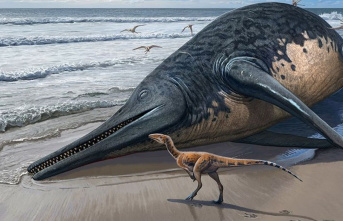Whether it's vaccines, the climate crisis or genetically modified organisms: Some scientific topics evoke conflicting and very strong opinions. A study presented in the journal "PLOS Biology" confirms previous analyzes that people with little specialist knowledge tend to reject findings from such research areas. In addition, people with a strong stance for or against science are more likely to rate their own knowledge as very high.
Specifically, the researchers surveyed 2,000 British adults about their attitudes towards science and how they assessed their own understanding of a variety of research topics in the field of genetics. They observed that respondents with the strongest attitudes - both supporters and opponents of science - were more confident in their own knowledge.
True/false questions asked included, "Eating a genetically modified fruit could also alter a person's genes," "All radioactivity is man-made," and "Tomatoes do not naturally contain genes, genes are only in to find genetically modified tomatoes".
"We found that strong attitudes, both pro and anti-science, are underpinned by strong confidence in knowing about science," says co-author Laurence Hurst. That makes psychological sense, according to the team: in order to have a strong opinion, you have to firmly believe in what you know about the basic facts.
Address science communication to a silent majority
However, this basic knowledge is not necessarily available: As the analysis confirms, those who express themselves most negatively about a research area tend to have little knowledge on the topic. According to the British researchers, at least in the case of genetically modified organisms, only a very small group of about five percent is extremely negative. In principle, the results cannot be generalized, emphasizes the research team. Religious attitudes played a major role in evolution, for example, and political positions in the climate crisis. It remains to be clarified to what extent the subjective understanding plays a part in such topics.
According to Eva Thomm from the University of Erfurt, the current findings confirm the results of earlier studies. "The consequence of overestimating one's own knowledge in connection with a critical attitude towards science can be that one relies on questionable information from questionable sources," explained the psychologist in an independent classification.
According to Thomm, the correlations found by the British researchers could also be applied to Germany, at least in part. A study published in "Nature Human Behaviour" in 2019, which also dealt with attitudes, subjective and actual knowledge about genetically modified organisms, also included a German sample and came to similar results.
In an analysis in which Thomm participated, the authors came to the conclusion that science communication campaigns should focus on reaching the silent, uncertain majority rather than convincing the loud minority.
Promote understanding of scientific processes
It was also said that simply passing on information could be counterproductive. "To overcome some people's negative attitudes towards science, one probably has to deconstruct what they think they know about science and replace it with a more accurate understanding," explains Anne Ferguson-Smith, co-author of the study in PLOS Biology ".
As Thomm emphasizes, it is also important to consider people's understanding of science: "What ideas do they have about how scientific knowledge is generated, how scientists discuss with each other or what scientific standards look like?" An appropriate idea of science includes knowledge about the uncertainty of scientific knowledge and about scientific controversies.
The lack of such knowledge could possibly be a driver for the development of a negative attitude. "Science communication must succeed in conveying such uncertainties as part of scientific processes without undermining trustworthiness or acceptance," says Thomm. "Contradictions and changes may initially cause discomfort. But they are also an expression of the fact that science works."











